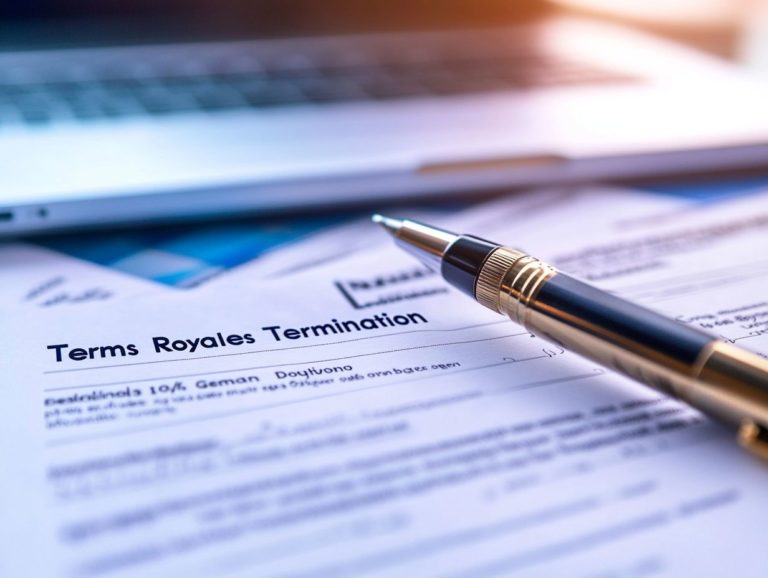Why Licensing Agreements Are Essential for Startups
Licensing agreements play an important role in the startup landscape. They act as a vital bridge between innovation and market success.
They not only protect your intellectual property but also provide access to new markets and valuable resources, making them a necessary tool for emerging businesses.
This article delves into the benefits and key components of licensing agreements. It offers insights on negotiation strategies and highlights common pitfalls to avoid.
Emphasizing the importance of legal guidance will help you navigate this intricate terrain with confidence.
Unlock the potential of licensing and supercharge your startup’s journey today!
Contents
- Key Takeaways:
- Understanding Licensing Agreements
- Benefits of Licensing Agreements for Startups
- Key Components of a Licensing Agreement
- Terms and Conditions
- Royalty and Payment Structure
- Negotiating a Licensing Agreement
- Tips and Strategies
- Common Mistakes to Avoid
- Potential Pitfalls and How to Avoid Them
- Legal Considerations for Licensing Agreements
- Frequently Asked Questions
- What is a licensing agreement and why is it important for startups?
- How can a licensing agreement benefit a startup?
- What are the key components of a licensing agreement for startups?
- What are the potential risks of not having a licensing agreement for startups?
- Can a licensing agreement be beneficial for startups with limited resources?
- How can a startup ensure a fair and beneficial licensing agreement?
Key Takeaways:

Licensing agreements are crucial for startups. They protect intellectual property and provide access to new markets and resources.
When negotiating a licensing agreement, startups should pay attention to the terms and conditions. Carefully consider the royalty and payment structure.
Legal counsel is essential when creating a licensing agreement for a startup. It helps avoid common mistakes and ensures all legal considerations are met.
Understanding Licensing Agreements
Licensing agreements are essential for both startups and established companies. They provide a strategic framework that allows you to leverage the power of Intellectual Property (IP), which refers to the creations of the mind, like inventions and designs, while aligning with your business objectives.
These agreements offer legal clarity and reduce risks. They turn your innovative ideas into revenue through various structures, such as exclusive, non-exclusive, or sole licenses.
They also help you navigate the complexities of market reach and compliance across different territories. This makes them critical in today s competitive landscape.
Benefits of Licensing Agreements for Startups
Licensing agreements offer numerous benefits for you as a startup. They are especially useful for protecting your Intellectual Property (IP) and expanding your market reach.
They enable you to create a solid revenue stream while keeping initial costs in check.
Protection of Intellectual Property
One of the primary advantages of licensing agreements is the strong protection they offer for your intellectual property. This allows you to safeguard your inventions and maintain quality control over your products.
These agreements act as legal instruments that clarify ownership rights. They establish compliance standards for the licensed products you create.
By fostering an environment where intellectual property is respected, these contracts encourage your creativity and innovation. This gives you the confidence to navigate the intricate landscape of legal considerations.
The quality control measures in licensing agreements help preserve the integrity of your product. This ultimately enhances your market reputation and consumer trust.
In a competitive landscape, leveraging your intellectual property through licensing strengthens your position and paves the way for sustainable growth.
Access to New Markets and Resources
By entering into licensing agreements, you gain access to new markets and valuable resources. This significantly enhances your market reach and overall growth strategy.
This strategic approach allows you to leverage established brand recognition and distribution channels. It accelerates your entry into competitive landscapes.
Licensing can also foster innovative partnerships. This enables you to collaborate with industry leaders who possess key technological advantages.
As you navigate the complexities of global commerce, these agreements help you mitigate risks and maximize returns. You can focus on your core competencies while relying on partners for market insights and logistical support.
Ultimately, this collaborative model promotes economic growth and opens doors to diverse consumer bases that were previously out of reach.
Key Components of a Licensing Agreement

A comprehensive licensing agreement includes several essential components. You should pay close attention to these.
These encompass detailed terms and conditions, clearly defined royalty payment structures, and precise specifications regarding duration and territory. Each of these elements is crucial for fostering a successful partnership.
Terms and Conditions
The terms and conditions outlined in licensing agreements are essential for defining your rights and responsibilities. They ensure compliance with legal standards while fostering transparent business relationships.
By establishing clear guidelines, these agreements minimize misunderstandings and disputes. This clarity specifies your usage rights and addresses important elements like royalties, durations, and termination clauses issues that directly influence how you operate your business.
Well-defined terms protect your intellectual property, providing legal safeguards and promoting fair usage. When both parties understand their obligations, collaboration and innovation can flourish, creating a productive partnership that benefits everyone involved.
Royalty and Payment Structure
Establishing a fair royalty and payment structure in licensing agreements is crucial. It directly influences financial outcomes for both licensors and licensees while ensuring a sustainable revenue stream.
Understanding the intricacies of this structure allows you to confidently navigate negotiations. Typically, royalties can be fixed, variable, or a combination, providing flexibility based on market performance and product demand.
Each model presents unique advantages and considerations. By thoroughly addressing these terms, you can foster successful partnerships that maximize revenue and open doors for future growth.
A well-negotiated agreement reflects a harmonious alignment of financial strategies, offering the stability needed in an ever-evolving marketplace.
Negotiating a Licensing Agreement
Navigating licensing agreements effectively is essential for startups. This shapes the terms that govern strategic partnerships and plays a pivotal role in your risk mitigation strategies.
Tips and Strategies
To negotiate effectively, establish clear objectives and understand the details of licensing agreements. Consider cost efficiency to leverage the benefits of strategic partnerships.
By outlining your goals clearly, you can navigate the complexities of various licensing terms more adeptly. Recognizing the implications of each clause is crucial, as these elements influence your risk management and financial outcomes.
Thorough research, including market analysis and identifying potential pitfalls, helps pinpoint favorable conditions that lead to win-win scenarios.
Utilizing strategies like open communication and flexibility during negotiations fosters trust. This paves the way for collaborations that mitigate risks and enhance overall value in the long run.
Common Mistakes to Avoid

Navigating licensing agreements requires awareness of common mistakes that could lead to pitfalls. This necessitates a proactive approach to risk mitigation and careful consideration of legal aspects.
Staying informed and vigilant safeguards your interests and ensures a smoother journey through licensing complexities.
Potential Pitfalls and How to Avoid Them
Potential pitfalls in licensing agreements often stem from insufficient risk assessment and a lack of legal clarity. It’s vital for startups to implement preventive measures.
Ambiguous terms can lead to misunderstandings and disputes, potentially jeopardizing projects or financial stability.
To mitigate these risks, engage legal professionals specializing in intellectual property and licensing. They can help draft clear, comprehensive agreements that outline rights and responsibilities.
Conducting thorough due diligence is equally important. Ensure your licensing partner has a solid reputation and compliance history. Regularly review agreements to keep them aligned with your evolving business goals and regulatory changes, safeguarding both parties from future conflicts.
Legal Considerations for Licensing Agreements
Understanding the legal nuances of licensing agreements is essential for startups. This understanding is your key to success in complying with Intellectual Property laws and lays a robust foundation for a thriving business.
Importance of Legal Counsel
Hiring a lawyer is essential for startups navigating licensing agreements. This expertise provides critical guidance on compliance and safeguards your intellectual property (IP) rights.
The complexities of these agreements can be overwhelming if you lack legal know-how. Legal professionals are invaluable in breaking down terms and conditions, ensuring all parties understand their rights and obligations.
Their expertise helps you avoid potential disputes and enables the creation of tailored licensing agreements that align with your business objectives. This strategic partnership gives you peace of mind, allowing you to focus on innovation and growth while remaining compliant with industry regulations and standards.
By cultivating a strong understanding of the legal landscape, you can better navigate licensing nuances, ultimately enhancing your competitive edge.
Licensing Strategies for Startups
Unlock your startup’s potential with powerful licensing strategies that help you break into new markets and validate your innovations. These strategies facilitate the commercialization of your technology in competitive environments.
Consider exploring various approaches, such as forming partnerships or collaborating with established players. This access can open broader distribution channels that would otherwise be out of reach.
By leveraging technology licensing agreements, you’ll have the opportunity to share your proprietary advancements while securing financial support and valuable market insights.
Implementing market penetration techniques like targeted advertising and engaging with customers can significantly enhance your visibility and attract potential clients.
Ultimately, these strategies encourage collaboration and position your startup as a credible contender in your industry, driving sustainable growth and fostering innovation. Start exploring your licensing options today to propel your startup forward!
Watch this video to learn more about licensing agreements for startups.
Frequently Asked Questions

What is a licensing agreement and why is it important for startups?
A licensing agreement is a legal contract between two parties that grants one party the rights to use the intellectual property of the other in exchange for a fee or royalty. For startups, these agreements are crucial as they allow the use of existing technologies, brands, or products to develop and market new offerings without investing time and resources in creating them from scratch.
How can a licensing agreement benefit a startup?
A licensing agreement can benefit a startup by:
- Providing access to established and proven technologies or brands
- Reducing development costs and time
- Allowing for faster market entry
- Helping build credibility and gain a competitive advantage
What are the key components of a licensing agreement for startups?
The key components of a licensing agreement include:
- A detailed description of the licensed intellectual property
- The scope of the license
- Payment terms
- Confidentiality and non-disclosure clauses
- Termination conditions
- Any restrictions or limitations on the use of the licensed property
What are the potential risks of not having a licensing agreement for startups?
Not having a licensing agreement can leave startups vulnerable to legal disputes and potential infringement lawsuits, which can be costly and time-consuming. It can also hinder growth and innovation by limiting access to valuable technologies and brands owned by others.
Can a licensing agreement be beneficial for startups with limited resources?
Yes, a licensing agreement is highly beneficial for startups with limited resources as it allows them to leverage existing IP without heavy upfront costs. This focus on product development and marketing can increase their chances of success in the market.
How can a startup ensure a fair and beneficial licensing agreement?
To ensure a fair and beneficial licensing agreement, startups should:
- Carefully review all terms and conditions
- Seek legal counsel if necessary
- Negotiate for favorable terms
- Conduct thorough research on the licensor and the licensed property to ensure its value and potential






